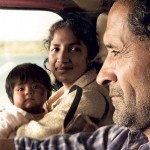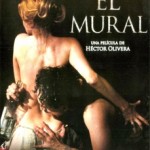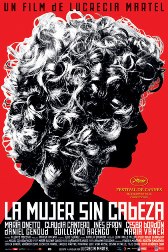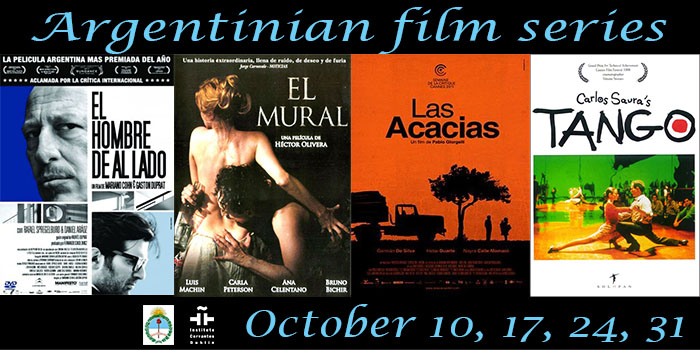Blog del Instituto Cervantes de Dublín
Torre Martello
Cine | Film Screening: Tango
Today is the last session of the Argentinian Film Series with the screening of the critically aclaimed film Tango by Carlos Saura. You can enjoy it at 6pm at Café Literario.
Set in Buenos Aires, the film tells the story of director Mario Suarez’s quest to make the ultimate tango film. Lonely after his wife has left him, Mario must find the themes that will hold the film together, while simultaneously permitting his musicians and dancers the freedom of expression that is necessary to satisfy the tango-hungry Argentine audience. Things become complicated when Mario falls in love with Elena, a beautiful and talented young dancer who is the girlfriend of the powerful and dangerous Angelo Larroca, an investor in the picture.
Film screening | Cine: Las acacias
Todavía estás a tiempo de disfrutar del estupendo ciclo del cine argentino más actual. La película de hoy es Las acacias y se proyectará a las seis en el Café Literario.
se proyectará a las seis en el Café Literario.
La ruta que une Asunción de Paraguay con Buenos Aires. Un encargo: camionero debe llevar a una mujer desconocida. La mujer no llega sola, trae una niña en brazos. 1.500 kilómetros de viaje por delante.
La ópera prima de Pablo Giorgelli (…) presenta un conflicto menor que progresa a medida que los minutos transcurren, para terminar convirtiendo una historia mínima en una lección del más puro cine (en Escribiendo Cine).
Película ganadora de la Cámara de Oro en el último Festival de Cannes y premiada en San Sebastián, Londres, Biarritz y Bratislava, entre otros.
You can still enjoy the best of Argentinian cinema thanks to the film series that we show in October. The film that will be shown today is Las Acacias. The screening will be at 6pm at Cafe Literario.
Rubén is a lonely truck driver who has been covering for years the motorway from Asunción del Paraguay to Buenos Aires, carrying wood. However, today’s journey will be different. This morning, in a motorway stop near Asunción, Jacinta shows up an hour later to begin a journey by track which is going to take her to Buenos Aires. What’s more, Rubén finds out at that very moment that little Anahí, who’s 8 months old, will travel with them- It is not the best beginning. As kilometres go by, the relationship between Rubén and Jacinta will grow. They will slowly meet and sip into each other’s soul. None of them talks much about their lives. None asks much either. It’s a few word journey but it is not a silent one.
Awarded the Golden Camera at the Cannes Film Festival and other prizes in San Sebastián, London, Biarritz and Bratislava, just to mention a few.
Cine / Film screening: El mural
La segunda sesión del ciclo de cine argentino llega hoy a las seis al Café Literario con la proyección de la película El mural.
La trama desarrolla su acción en los años treinta, cuando llega al país David Alfaro Siqueiros. El film relata las distintas circunstancias que llevaron al pintor a realizar el famoso mural en la quinta Los Granados, propiedad de Natalio Botana, con la colaboración de los pintores argentinos Lino Enea Spilimbergo, Antonio Berni y Juan Carlos Castagnino y el uruguayo Enrique Lázaro; más las complicadas y entrecruzadas relaciones entabladas entre los personajes protagonistas de la historia.
distintas circunstancias que llevaron al pintor a realizar el famoso mural en la quinta Los Granados, propiedad de Natalio Botana, con la colaboración de los pintores argentinos Lino Enea Spilimbergo, Antonio Berni y Juan Carlos Castagnino y el uruguayo Enrique Lázaro; más las complicadas y entrecruzadas relaciones entabladas entre los personajes protagonistas de la historia.
Película ganadora de cinco Premios Sur 2010: Mejor Fotografía, Mejor Montaje, Mejor Dirección artística, Mejor Diseño de vestuario y Mejor Maquillaje y Caracterización.
The second session of the Argentinian film series will be held today at 6pm at Cafe Literario with the screening of El mural.
The plot takes place in the 30s, when David Alfaro Siqueiros arrived to the country. The film relates the several circumstances leading the artist to paint the famous mural in Los Granados, the country estate of Natalio Botana, with the collaboration of Argentinean painters Lino Enea Spilimbergo, Antonio Berni and Juan Carlos Castagnino, and the Uruguayan Enrique Lázaro. The story reveals the complicated criss-cross relations among the main characters.
Awarded five Premios Sur 2010: Best Photography, Best Editing, Best Art Direction, Best Costume Design, Best Makeup and Portrayal.
Nuevo ciclo de cine argentino en el Cervantes de Dublín / Argentinian Film series at #ICervantes #Dublin
Mañana miércoles comienza el nuevo ciclo de cine argentino en el Instituto Cervantes de Dublín, ofrecido por la Embajada de Argentina en Irlanda.
El cine argentino ha sido históricamente una de las tres filmografías más desarrolladas dentro del cine latinoamericano, junto a las producciones mexicanas y brasileñas.
Así, el cine creado en Argentina durante el siglo XX se convirtió en uno de los principales embajadores del idioma español por el mundo. La bandera de Argentina, del año 1897, se podría considerar como la primera obra cinematográfica nacional y desde su estreno hasta nuestros días han llegado a las pantallas cerca de 2500 películas argentinas con gran éxito de crítica y público, siendo La historia oficial (1985) y El secreto de sus ojos (2009) ganadoras del Oscar a la Mejor Película Extranjera.
En este ciclo podrás ver películas muy recientes como El hombre de al lado (2010), El mural (2010) o Las acacias (2011).
El ciclo será inaugurado mañana, 10 de octubre a las 18h con una recepción por cortesía de la Embajada de Argentina en Irlanda.
Come and enjoy the four films screened in this series offered by the Embassy of Argentina and Instituto Cervantes Dublin.
You will be able to see how Argentine cinema has been historically one of the three most developed productions of Latin American cinema, followed by Mexican and Brazilian production.
This way, the variety of films produced in Argentina during the 20th century bacame one of the most important ambassadors of the Spanish language all over the world. La bandera de Argentina (1897) could be considered the first national cinematographic piece and since its premiere, nearly 2500 argentine films have reached theatre screens with great acclaim from both critics and audiences.
Worth mentioning are La historia oficial (1985) and El secreto de sus ojos (2009), both awarded an Oscar for Best Foreign Language Film.
You could enjoy of recent films such as The man of next door (El hombre de al lado, 2010), El mural (The mural, 2010) or Las acacias (2011).
The Embassy of Argentina offers a wine reception on the opening of the film series, in October 10th at 6 pm.
La biblioteca propone: Cine argentino | The library suggests: Argentinian Cinema
El cine argentino más actual llega este mes a nuestra pantalla del Café Literario, dentro de nuestra programación cultural para el mes de octubre.
para el mes de octubre.
También desde la biblioteca también queremos rendir homenaje a una de las cinematografías más potentes de Sudamérica tanto por la calidad de sus películas como por el número de producciones.
Tras la dolorosa dictadura que sufrió Argentina durante la década de los 70 y primeros años de los 80, su cine experimentó un nuevo renacer. Realizadores como María Luisa Bemberg con Camila, Luis Puenzo con La Historia Oficial y Adolfo Aristarain (Tiempo de revancha, Un lugar en el mundo), atrajeron la mirada de nuevos públicos.
En la década del noventa surge una nueva corriente denominada normalmente como nuevo cine argentino, marcada por el carácter independiente de las realizaciones y un cambio en la mirada. El precursor en este movimiento es Martín Rejtman con su ópera prima Rapado en 1991.
A esta película le siguieron Mundo Grúa, El bonaerense y otras que continuaron esa línea de películas de tónica y personajes reales, bajo presupuesto y actores no conocidos.
The latest Argentinian cinema comes to our screen in the Café Literario, as part of the cultural programme in October.
From the library we would like to pay tribute as well to one of the most powerful cinematographies of South America referring to the number and quality of its films.
After the military dictatorship during the 70s and first part of the 80s, Argentinian cinema experienced a new reawakening . Films makers such as María Luisa Bemberg with Camila, Luis Puenzo with La historia oficial and Adolfo Aristarain (Tiempo de revancha, Un lugar en el mundo) attracted the interest of a new audience.
There was a new trend during the 90s usually called the new Argentinian cinema and it stood out because of the independent style of the films and a change in its approach.
The precursor of this change was Martin Rejtman with his opera prima Rapado in 1991.
After this film we can find Mundo Grúa, El bonaerense and other films that continued that style with realistic characters, low budget and not very well-known actors.
Cine / Film screening: El secreto de sus ojos
Nueva cita con el mejor cine hoy a las 6 de la tarde en el Café Literario.
En 2005, Eduardo Sacheri publicó la novela La pregunta de sus ojos. La novela fue llevada a la gran pantalla bajo el título El secreto de sus ojos, película que en 2010 ganó el Oscar a mejor película extranjera. Ahora, Instituto Cervantes te trae esa película para que la disfrutes, dentro del marco del Bealtaine Festival.
La historia: Argentina, años 70. Benjamín Espósito es oficial de un Juzgado de Instrucción de Buenos Aires y está a punto de retirarse. Obsesionado por un brutal asesinato ocurrido treinta años antes, decide escribir una novela sobre el caso, del cual fue testigo y protagonista. Reviviendo el pasado, viene también a su memoria el recuerdo de una mujer, a quien ha amado en silencio durante todos esos años.
The best cinema is coming back today at 6pm at Café Literario.
In 2005, Eduardo Sacheri published his novel La pregunta de sus ojos. Years later, a version from the novel was filmed under the name of El secreto de sus ojos, which won the Oscar, in 2010, for best foreign language film. Now, Instituto Cervantes Dublin, brings you the film to enjoy it, as part of the Bealtaine Festival.
The story: Argentina, year 1970. Benjamín Espósito is an official at a Magistrates court in Buenos Aires and he is about to retire. He is obsessed with a brutal murder that took place thirty years ago. He decides to write a novel on the case where he was a witness and main character. While reliving the past he remembers a woman he silently loved all those years.
Juan Diego Botto en la Biblioteca Del Instituto Cervantes Dublín
Juan Diego Botto visitó nuestra biblioteca el pasado 13 de julio para presentar el ciclo de cine argentino organizado en el Instituto Cervantes de Dublín. Juan Diego tuvo la amabilidad de contestar a las preguntas de nuestra compañera Carmen Sanjulián. En nuestro canal de televisión podéis ver la entrevista completa en video.
Juan Diego Botto nació en Buenos Aires en 1975. La situación política de Argentina en aquellos años acabó con la vida de su padre, y el resto de la familia se vio obligada a exiliarse a España cuando Juan Diego tenía cuatro años.
En esta entrevista, tendremos la oportunidad de conocer más detalles sobre la vida de este actor que comenzó su andadura con tan sólo cinco años en la película Juego de Poder de Fausto Canel, de la que, según nos cuenta, tiene tan solo vagos recuerdos. Nunca imaginó que la de actor podría ser su profesión. En aquellos primeros momentos, aquel “juego” era sólo una excusa para no ir al colegio y para conseguir todos los juguetes que salían en la película, como le habían prometido.
Pero conforme fue pasando el tiempo, Juan Diego Botto fue haciendo de la interpretación su vida, hasta llegar a conseguir tres candidaturas a los premios Goya y el premio al Mejor Actor en el Festival de El Cairo.
Juan Diego Botto visited our library last July to present the Argentine film series organized by Instituto Cervantes in Dublin. Juan Diego was kind enough to answer the questions of our colleague Carmen Sanjulián. In our TV channel you can see the full interview on video.
Juan Diego Botto was born in Buenos Aires in 1975. The political situation in Argentina in those years killed his father and the rest of the family was forced into exile in Spain when Juan Diego was four.
In this interview, we will have the opportunity to learn more about the life of this actor who began his career with only five years in the film Juego de Poder directed by Fausto Canel. But he never imagined that acting could be his profession. In those first moments, this “game” was just an excuse to avoid going to school and get all the toys that were displayed in the film, as the producer promised to him.
But as time passed, Juan Diego Botto made of acting his life, until he got three nominations for the Goya Awards and the award for Best Actor at the Festival of Cairo.
Dos hermanos / Brother and sister
Hoy / Today 19/07/2011 6:00 pm.
Instituto Cervantes
Lincoln House, Lincoln Place
Dublin 2




